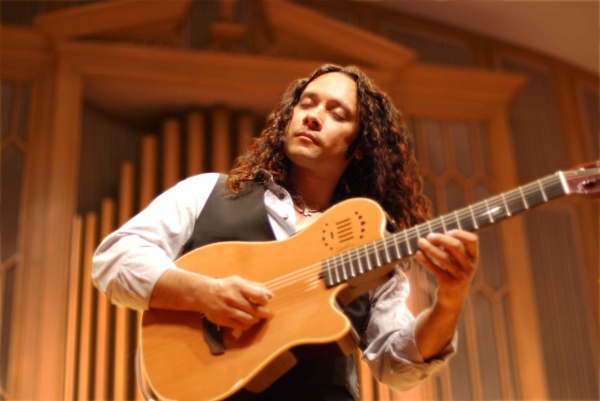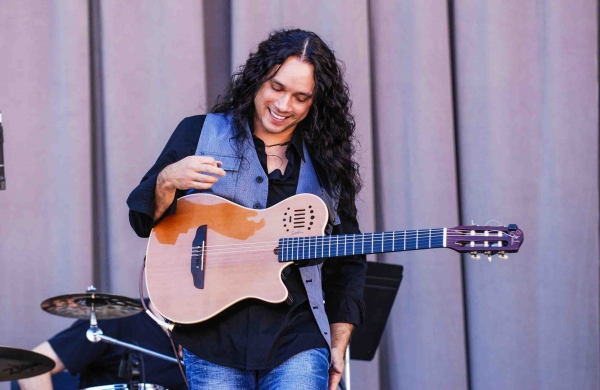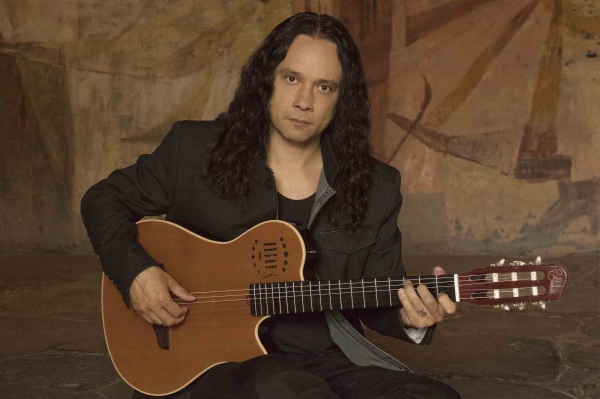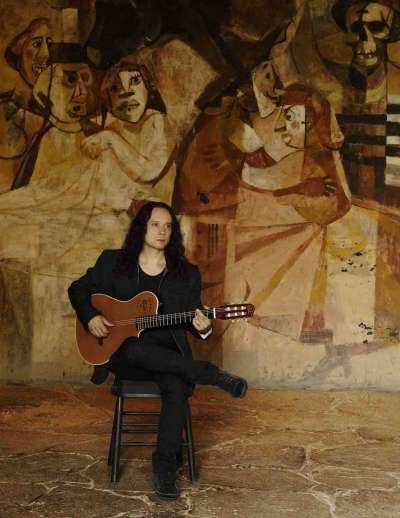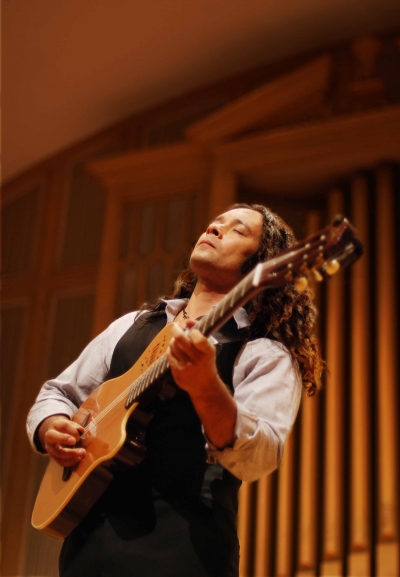If you've read very many of my reviews, you know that I tend to gravitate toward artists who are blazing their own trails and creating music that is "outside the box." Guitarist/composer Russ Hewitt is one such artist. With a background that includes a degree in classical guitar performance and a number of years as rock guitarist as well as immersion in various Latin/Spanish genres, Russ' new music is always fresh and different. He recently released his fourth album,
Chasing Horizons, which Michael Debbage and I both reviewed and love, so it seemed like a good time to catch up. Russ and I did our
first interview in 2009, so we're actually 'way past due! Enjoy!
KP: Good grief, Russ! I can't believe it's been thirteen years since we did our first interview! You had just released your "official" debut album, Bajo El Sol, and you were actually my first interview with a non-pianist. We've both come a long way! In the meantime, we had a chance to meet at the 2017 NAMM Show in Anaheim, CA, which was fun! Are you still based in the Dallas, TX area?
RH: Yes. I'm in the middle of America, so it's equal distance if I need to go to California or Florida. Nashville is close, as is Austin, so I'm central to everything.
KP: You recently released Chasing Horizons, your fourth album, and Michael Debbage and I both gave it very favorable reviews. Tell us about it.
RH: Chasing Horizons took me four years from start to finish. I wrote it as I've written all of my previous music, just me alone until I get the song to the point where I present it to my producer. I have learned what seems to work and not work for a recording and live over the years. I used the same core producer and backing band as my previous recordings as well. If there is one thing I would change, it would be the speed of which I write music. Sometimes I would spend all day just on the smallest melody or part. In this digital age, everything lasts forever, so I want to make sure that I've exhausted every angle and thought I had. Once the basic tracks were recorded, we then explored which guest artists would work with which song.
KP: It seems that calling your music "Latin/World" becomes even more appropriate with each album. For those who missed it the first time around, would you explain why you call your music "Latin/World"?
RH: I'm fusing Spanish, flamenco, jazz, Latin, Cuban, Brazilian, and anything else I like together simultaneously without worrying about what particular rules go with each style. Under the Latin/World description, that allows me the freedom to have a Samba, guajira, montuno, rumba flamenco, tango, milonga, cumbia, and more all in one CD. I think because of that, the listeners' ears don't get tired or bored with the music. I have also started to add 'Spanish' in the description, just to help clarify what I do.
KP: The closing track on the album, "Return to Simitai," is an outstanding example of this mixing of styles. The piece features Tri Nguyen playing đàn tranh, a plucked Vietnamese zither, and the piece really creates an East-meets-West celebration! How did this piece come into being?
RH: This song appeared on my first CD under the title "Simatai (View from the Great Wall)," inspired by my experience visiting the location. I think most artists, myself included, are always re-writing or wishing they would have done 'this or that' to any piece of music or art. There's the saying, "No artist is ever completely finished, they just stop and move on," which I find as true. I've always wanted to do something more with the song, and it wasn't until discovered Tri Nguyen and the Vietnamese zither that a vision came into my head. Being half Vietnamese, on my mother's side, I thought this would be a great way to combine many worlds together. "Return to Simitai" is a re-imagined version of the original.
KP: Interesting! I had no idea!
When we did our first interview in 2009, you were taking extended back-packing trips all over the world, playing impromptu gigs with all kinds of different musicians. Are you still able to take those trips?
RH: Yes! In fact, I'm going to Thailand and Cambodia later this year and look forward to any opportunity that might arise. Music is just music, right? Meaning, if you have even a basic understanding of your instrument and know a little theory or have a good ear, you should be able to navigate through anything. You see it all the time now in videos, one person playing (usually a piano) and a stranger walks up, joins in, and it's magical. The moment you take away the human interaction with music, it become cold.
KP: I agree, and it also has to be a ton of fun to jam with musicians from another culture! I'm sure exposure to all of those kinds of music and musicians has played a big part in your having such a distinctive musical voice. Have you always had a love of a wide variety of musical genres and styles?
RH: Yes, I would go through my phases. I would 'discover' a new genre like gypsy jazz/lounge/bluegrass flat picking/nuevo tango/etc., do a deep dive into it, and then at some point move on to the next one. YouTube and streaming has really made it easier now to come across a musician/style/genre. I call it my YouTube 'wormhole,' Ha! As any musician or artist, you are the accumulation of everything you're exposed to, so why not be exposed to it all?
KP: I couldn't agree more!
You have a degree in classical guitar performance, and I'm sure that also figures greatly in your original music. Do you still perform classical guitar, too?
RH: Very little actually. I miss it, but there just isn't enough time in the day to include it. Particularly as an independent artist, I'm spending half my time already on the 'business' side of things. To play the traditional classical pieces, and even more so with the modern pieces, it's a completely different discipline and mindset. What I do is write and improv with band interaction, and classical music is interpretation and technique. That's very general of course, but you get the idea.
KP: Oh yeah! I have such admiration for musicians who can do both.
The
video for "Vivir Libre" from the new album is a wonderful expression of freedom with footage of the ocean and various shorebirds. Where was it filmed?
RH: That footage was from a friend of mine who is a movie and TV director. All of my Telly's that I've won were in his productions. I wasn't going to have a video, and then at the last minute I called in a favor to him and asked if he could put something together in a week. The footage is from when he goes to Cannes, France for the film festivals.
KP: it's gorgeous! Former Megadeth guitarist Marty Friedman also plays on this track. How did that come to be?
RH: We are both endorsed by the same cable company, Analysis Plus Cables. After I had written and recorded the solo section, I thought of Marty. This was the type of chord progression he would excel in and I asked the cable company to make an email introduction. Marty heard the track, agreed to do it, and had it back to me within a week of touching base.
KP: My favorite track on the album is "Amor Perdido," which features a symphony orchestra in Bucharest. Tell us about the piece first.
RH: The song is written in the milonga style, which is essentially a slow tango. I had never written a piece where it starts out like a classical guitar piece, so that's what I set out to do. The song slowly builds until the chorus, bringing in the full band. This song benefited from the COVID lock down because it was already done and mixed when I got the call from my string arranger with the opportunity to record with the Romanian National Symphony Orchestra based out of Bucharest. It took one of my favorite songs and elevated it to something special. It took months of planning and coordination, but luckily we had the time.
KP: Did you actually go to Bucharest to record or was it one of those amazing high-tech collaborations?
Video
RH: We had planned to go to Romania, but COVID was real bad there and they were not letting anyone into the country. Due to the time difference, I had to get up early in the morning to listen in real time as the session was going on. I was able to talk and communicate as well. Technology is incredible nowadays!
KP: Is "Amor Perdido" the first of your pieces to be orchestrated?
RH: For a recording, yes. I have played with the Irving Symphony Orchestra, Mansfield Philharmonic, and various string quartets live, but this is the first time it has been done in a studio. My string arranger, Ric Flauding, did all of the orchestrations. Believe it or not, I actually write music with the idea of what it might sound like with an orchestra. There are strings and keyboards in most of my songs, they're just mixed low to add the vibe or feel I'm going for. There are videos of me playing with the Irving Symphony Orchestra on my YouTube channel,
Russ Hewitt Music.
KP: You often collaborate with (Jorge) Strunz and (Ardeshir) Farah, and both appear on this album, but on different tracks - "Sunset Samba" and "Cubalia Cafe." Both pieces are lively and upbeat - kind of a Latin Smooth Jazz vibe. When you are working with other artists like this, do you let them create their own parts or do you specify what you want from them musically?
RH: For the featured artists, I just want them to do what they do. That's really true for the backing band as well. I'm bringing in high level/World class talent, and they're going to bring to the table something that either I don't know, or can't do. My only requests with Nuno Bettencourt and Marty Friedman were to record with either a nylon string or an acoustic guitar. The songs are all written and a rough mix is already done by the time I approach a guest artist. I want them to hear the track as it would appear on the recording so they can get a sense and feel of what I'm trying to accomplish.
KP: That really makes good creative sense!
Some artists have said that the pandemic freed them up to create a lot of new music, and others found it difficult to create with all that has been going on. How did the COVID pandemic affect you and your career?
RH: The new CD was to come out right at the start of the pandemic. I was lining up everything and had a rough release date when the March shut down happened. I thought I should 'wait it out' and see how things were going to go. That is one of the reasons it's been six years since my last release. The good thing that happened because of COVID is that I was able to get a couple of additional guest artists on the recording I wouldn't have been able to have otherwise. The other good aspect of the shutdown was I was able to finish up a bunch of 'almost done' projects as well. Of course in terms of gigs, studio work and touring, that all stopped.
KP: Are you getting back to more live performances again?
RH: Yes. Gigs and private events are going good. Touring is something I'll need to spend more time looking at. There's just an economic side to it, particularly for someone at my level, where it makes sense to do. I am looking at touring India with either Dubai or Japan added sometime next year.
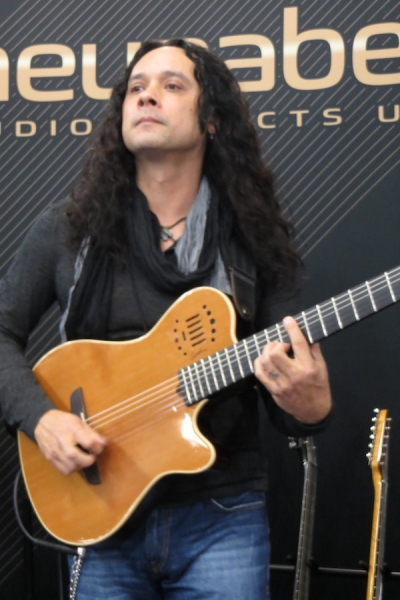
Playing at the 2017 NAMM Show
in Anaheim, CA.
KP: Wow! That will be interesting! What has been your most exciting musical moment so far?
RH: Playing with a 60-piece Symphony Orchestra doing my original music is pretty high up there. This new CD is a landmark achievement for me, writing and playing wise as well. It's not always the 'big' moments either - sometimes it's the smaller moments that you look back on and remember fondly. They always say 'It's the journey, not the destination...' and the older I get and the more I do, the more I believe the saying.
KP: Yes! What's up next for you?
RH: I'm doing press, promotion, and a Grammy push right now through the end of the year. I've got ten different things I'm laying the ground work for right now, so it's just a matter of which one takes off first. I will get back into the writing mode by the end of the year.
KP: In our first interview, you said you had about twenty guitars. How many do you have now?
RH: I still only have 20 guitars, but they are a different 20 than what I had then. Ha! I try to keep guitars that I know I can use, but there are still a couple of old ones I can't get rid of. I go through phases where I have a lot, then feel the need to get rid of them, and then it starts all over. Ha.
KP: That sounds pretty normal to me!
If you could have any three wishes, what would they be?
RH: Well, there's always the unintended consequence of a wish right? Ha! For me, it's more of a reminder to appreciate the moment, pets, friends and family, etc. Creating memories is important to me, more so now than ever.
Many thanks to Russ Hewitt for taking the time to chat!!! For more information about Russ and his music, be sure to visit
his website and his
Artist Page here on MainlyPiano.com.
Kathy Parsons
September 2022

